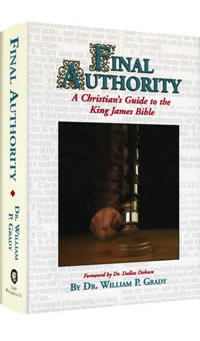From Faith to Doubt - The Making of an Agnostic
By David W. Daniels
A recent Newsmax article reviewed a new book attacking the Bible. It`s by Bart Ehrman titled, Forged: Why the Bible`s Authors Are Not Who We Think They Are. This subject isn`t new. It`s one of myriads of publications over the centuries that have shot spit wads at God`s holy words.
What`s most amazing is the author, Bart Ehrman. His path to agnostic and Bible disbeliever is a classic case of faith to doubt. Ehrman was originally concerned with the very words of God. But his teachers at Fundamentalist Moody Bible Institute tore at his faith when they taught the lie that only the originals were inspired scripture. What about the copies? Couldn`t they carry that same inspiration? In his earlier book Misquoting Jesus, Ehrman got to the heart of the issue:
"...this was a compelling problem. It was the words of scripture themselves that God had inspired. Surely we have to know what those words were if we want to know how he had communicated to us, since the very words were his words, and having some other words (those inadvertently or intentionally created by scribes) didn`t help us much if we wanted to know His words."
So Ehrman bought the lie that we could only trust the originals, not perfect copies and accurate translations. The next logical step was to try to figure out what the originals might have said. For this, Ehrman transferred to Wheaton College to supposedly learn "correct Hebrew and Greek." There they built on the first lie with another one going back to Origen of Alexandria, that the Bible could only be understood "by the scholarly elite." (NOTE: The popes use a variation of this lie, saying only the "church" can accurately interpret the Bible.)
Now the bomb dropped. With foundations destroyed, he pushed on to Liberal (if even "Christian") Princeton Seminary. After seeing a few extremely contradictory Greek manuscripts, he scrapped all his belief in the inspiration of scripture. He wrote:
"If [God] wanted his people to have his words, surely he would have given them to them (and possibly even given them the words in a language they could understand, rather than Greek or Hebrew). The fact that we don`t have the words surely must show, I reasoned, that he did not preserve them for us. And if he didn`t perform that miracle, there seemed to be no reason to think that he performed the earlier miracle of inspiring those words." [emphasis ours]
He didn't question his professors —instead he doubted his Bible! Ehrman admits: "This was a seismic change for me. The Bible began to appear to me as a very human book." In his new book, Erhman decides without evidence that we`ve been handed a book of fakes, that the gospels and epistles weren`t really written by Peter, Paul, etc., but were "forged" by someone else.
Bart Erhman bought a huge lie from the start, that only the "originals" were inspired scripture. The important scripture on inspiration, 2 Timothy 3:14-17, makes it clear that the Bible scrolls that Timothy had learned from his youth, copies of copies of copies, were actually scripture and carried that inspiration given by God! Those verses are not talking about some long-ago-perished originals.
Second, Ehrman was taught not to look for God`s preserved words among the thousands of almost identical manuscripts and the Bibles of persecuted believers. He was pushed to try to find God`s words among a handful of contradictory manuscripts written by Greek philosophy-loving "scholars" like Origen —a journey doomed from the start.
But you don`t have to fall by the wayside, as in the tragic case of Bart Ehrman. You can have God`s preserved words in English, the King James Bible, a Book that carries that same inspiration as the originals did —from exact copies and accurate translations. You don`t have to say, "Yea, hath God said?" You can declare, "Thus saith the Lord!" The choice is yours.
For more information on Satan`s continuing campaign to replace faith with doubt, see Did the Catholic Church Give Us the Bible?, Look What`s Missing, and Answers to Your Bible Version Questions, available from Chick Publications.
- See more articles on related topics:
- Bible Versions
- Bible Translation
- Bible vs. Professor
Other Articles from May/June 2011:
More on Bible Versions:
Products of Interest:
-

Look What's Missing!
256 pages
For years, publishers have been removing words, and even whole verses, from modern Bibles. What's missing from your Bible? Take a look! -

Answers to Your Bible Version Questions
224 pages
David W. Daniels answers difficult questions about the KJV. Learn how to defend the KJV and why you can trust it. -

Final Authority
392 pages
Reading much like a novel, this book tells the story behind the King James Bible, and the story of attempts to stop it through intrigue, slander and attempted murder of the King.



